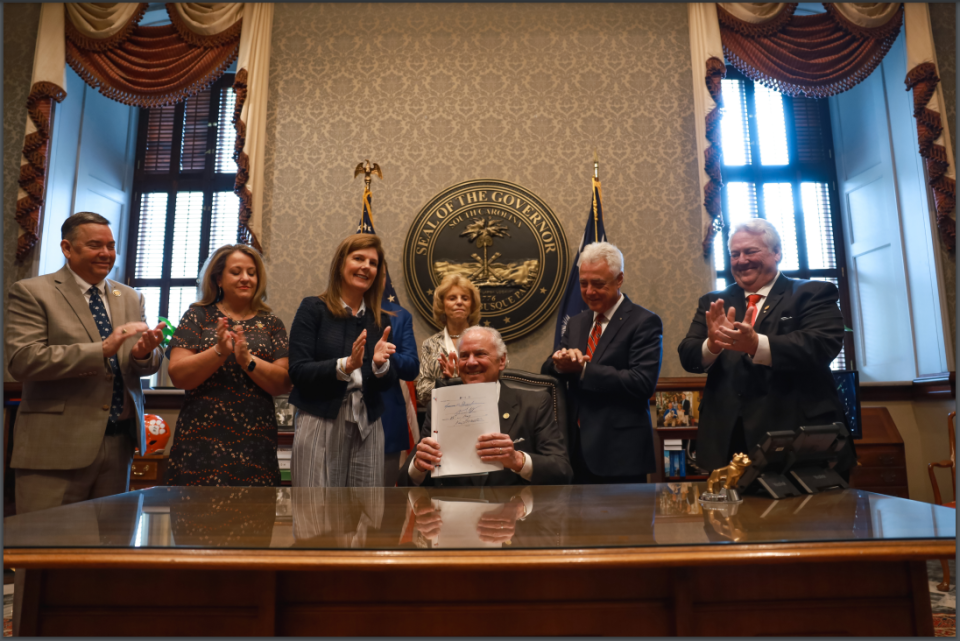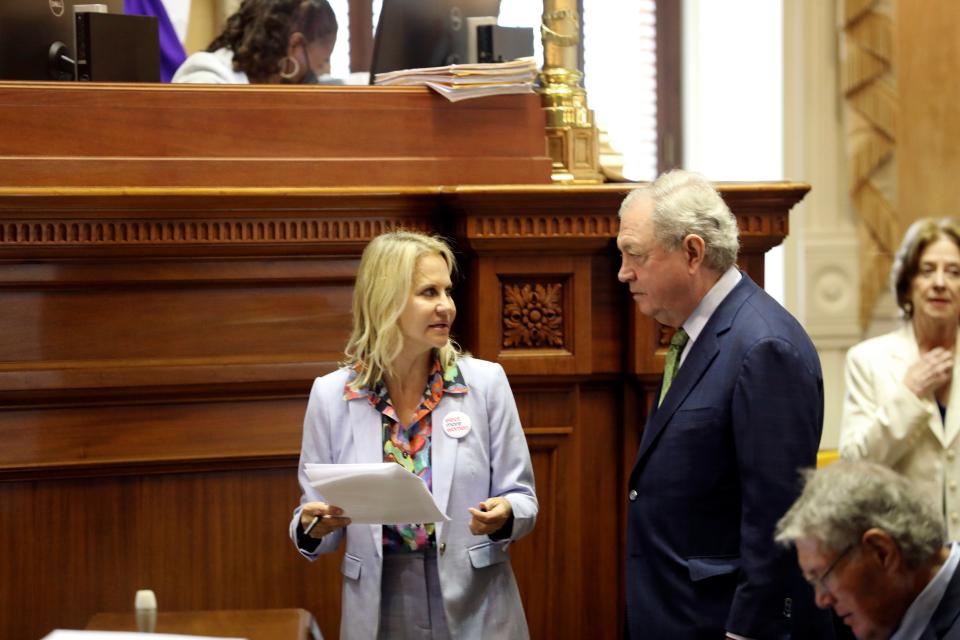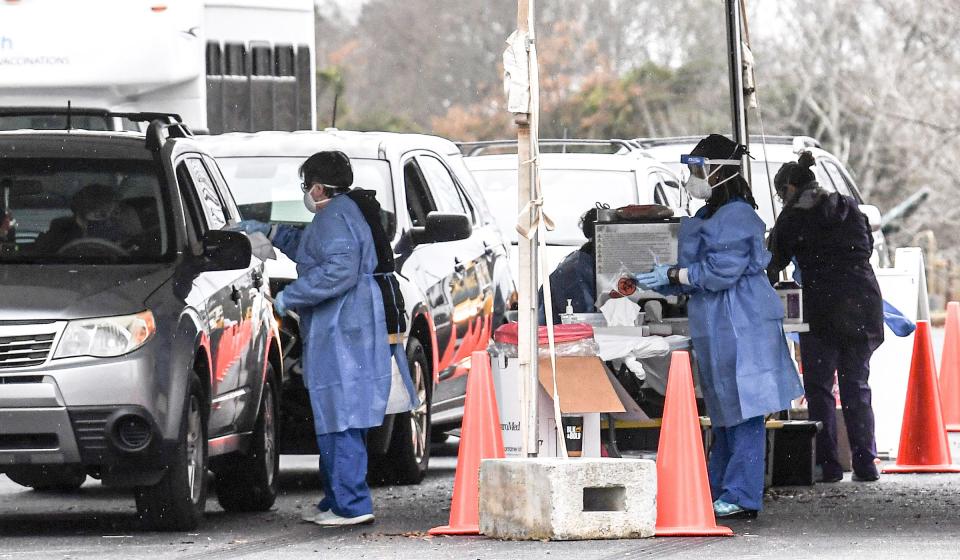Abortion bans, school vouchers, shield law. Here's what became law in SC this session.
As budget deliberations continue, lawmakers leave the South Carolina Statehouse this week after shepherding 89 bills past the finish line.
The Republican-controlled legislature achieved several pieces of legislation it had prioritized earlier this year, starting with an unwavering goal of passing a version of an abortion ban and a voucher law to allow the use of public dollars in religious and private schools.
Lawmakers also found a solution to their long-standing death row logjam by passing a shield law, keeping details of executions, lethal-injection drug companies and executioners hidden from the public.
Some legislation lie in wait for January 2024. The critical race theory bill, seeks to ban gender diversity education and biased teaching of histories; a bill to allow South Carolina gun owners to carry their guns without a permit and a flailing medical marijuana bill.
Winthrop poll: SC Republicans, Democrats agree on closing 'Charleston loophole'
Here's what's next: Greenville clinic joins lawsuit to block SC six-week abortion ban.

Here are bills that made it past the finish line:
Abortion debate dominates Statehouse session
Once the S.C. Supreme Court ruled that the 2021 six-week abortion ban, which banned all pregnancies after the detection of cardiac activity, violated privacy rights enshrined in the state constitution, gears started turning.
Republican lawmakers tweaked the language in the erstwhile fetal heartbeat bill, added definitions to legitimize the notion that personhood began at conception and emphasized the state's interest in protecting a fetus.
The abortion debate dominated the legislative calendar this year. Lawmakers met on five separate occasions and debated for weeks, and in the end, Republican lawmakers achieved their goal of changing the current state law that allows abortions up to 22 weeks.
Much like last year, the Senate led a movement to revive the six-week abortion ban and was caught in a standoff with House lawmakers, who were eager to pass a near-total abortion ban that blocked abortion access from the time of conception. Both bills had exceptions for rape, incest and fetal anomaly.
In late April, five female senators — three Republicans, one Democrat and one Independent ― joined forces to defeat a near-total abortion ban. Senators Sandy Senn, R-Charleston, Katrina Shealty, R-Lexington, Penry Gustafson, R-Kershaw, Margie Bright Matthews, D-Orangeburg and Mia McLeod, I-Richland took to the podium to explain the complexities of pregnancies.
For subscribers: Becoming Amberlyn: How one transgender woman's fight collided with SC's anti-trans fervor

They spelled out the many pregnancy complications that arise, and how some provisions of the abortion bans could violate a sexual assault survivor's privacy rights by mandating the involvement of the Sherriff's office in a rape-related pregnancy.
But while the near-total abortion ban failed, the six-week abortion ban prevailed. Eight House Democratic lawmakers led the effort to stall the bill by introducing 1,000 amendments.
During the debate, Rep. Beth Bernstein, D-Richland, who is Jewish, and said the abortion ban violated principles enshrined in Judaism and was not equitable. A National Council of Jewish Women advocacy brief delineated that abortion was not only permitted but was required if a pregnancy put the pregnant individual's life at risk. The brief also said that the current anti-abortion movement favored one religious viewpoint as different religions have varying views on when human life begins.
School voucher bill passes after lawmakers limit debate
Another bill with religious connotations came in the form of the voucher bill.
The bill, which could see a legal challenge, will allow middle-class families to enroll in a private, religious school. Next year, 5,000 students will be given $6,000 each to supplement payments for tuition, school supplies and counseling among others.
Previous attempts to institute a voucher program have failed in the past and one Upstate Republican shot back that the bill violated the separation between church and state.
"I'm against this bill is because we need to be cognizant of what separation of church and state means. How it protects government from the church, but it also protects the church from government," Easley lawmaker Neal Collins, R-Easley, said during the debate. "The moment a private or religious school accepts public money, they are forever at risk of public scrutiny and public norms."
GOP Caucus concerned by tactics: SC Freedom Caucus wants to change policymaking
Bipartisan effort helps pass paid parental leave for teachers, workforce housing
Lawmakers banded together to mandate paid parental leave for teachers, grow workforce housing in growing cities, like Greenville and Spartanburg, and structurally change an overburdened state agency like the Department of Health and Environment Control.
Last year, teachers were not part of the legislation that gave paid parental to state employees. The General Assembly-led Teacher Recruitment and Retention Taskforce said in their June 1 report that paid parental leave was essential to retain teachers.
Another bill, that would allow local governments the ability to use tourism dollars to build affordable housing, passed overwhelmingly. Sen. Ross Turner, R-Greenville, was a key sponsor of the bill.
High-growth, tourism-flush areas like Greenville continue to contend with issues related to affordable housing, which often leave low-income, Black workers priced out of living in the city.
Mayor Knox White (R) and City Councilwoman Dorothy Dowe (D) supported the legislation and said that it would help repair the affordability crisis in the city.

DHEC split into two parts
Lawmakers agreed DHEC is overwhelmed.
Not only did the state agency oversee public health issues, it is also responsible for restaurant inspections, regulating air pollution, along with monitoring clean energy and water bodies.
DHEC is now split into two parts. One-half will oversee public and mental health concerns. The second will now be called the Department of Environmental Services. The law also moves around some of DHEC's responsibilities to other departments. For instance, food safety programs related to assessing lead and dairy contaminations will be administered by the Department of Agriculture. The Land, Water and Conservation Division of the Department of Natural Resources will be clubbed with the Department of Environmental Services.
In addition, a long-sought move to wean hospitals off a bureaucratic requirement to file a certificate of need when they wanted to expand services or infrastructure made its way to McMaster's desk. Lawmakers say this will benefit rural areas that are in need of medical services.

Details of death penalty procedures will be kept confidential
Drug and pharmaceutical companies do not want to be publicly associated with capital punishment. With no way to resume executions using lethal injections, the state was left with archaic alternatives such as electrocution through a century-old electric chair or a firing squad.
But the S.C. Supreme Court ruled both methods were unconstitutional earlier this year.
The last execution in the state took place in 2011. Since then, incarcerated people on death row have remained uncertain about their fate. Lawmakers wanted to remedy the situation by passing a law that would keep the names of the drug companies a secret and would also extend that shield over details of executioners. Information related to capital punishment has always been secretive. However, the new law seals the information, even during legal discovery. Violation of the law could lead to up to three years of imprisonment.
The law raises concerns about accountability and transparency. Information related to taxpayer money spent on lethal injection drugs will remain confidential. The law also makes it hard to ensure any oversight into how the Department of Corrections and the state government is conducting executions and leaves less room for accountability if anything goes wrong.
Devyani Chhetri covers South Carolina politics for the Greenville News. Reach her via email at dchhetri@gannett.com.
This article originally appeared on Greenville News: Abortion bans, school vouchers, shield law. What became law in SC

